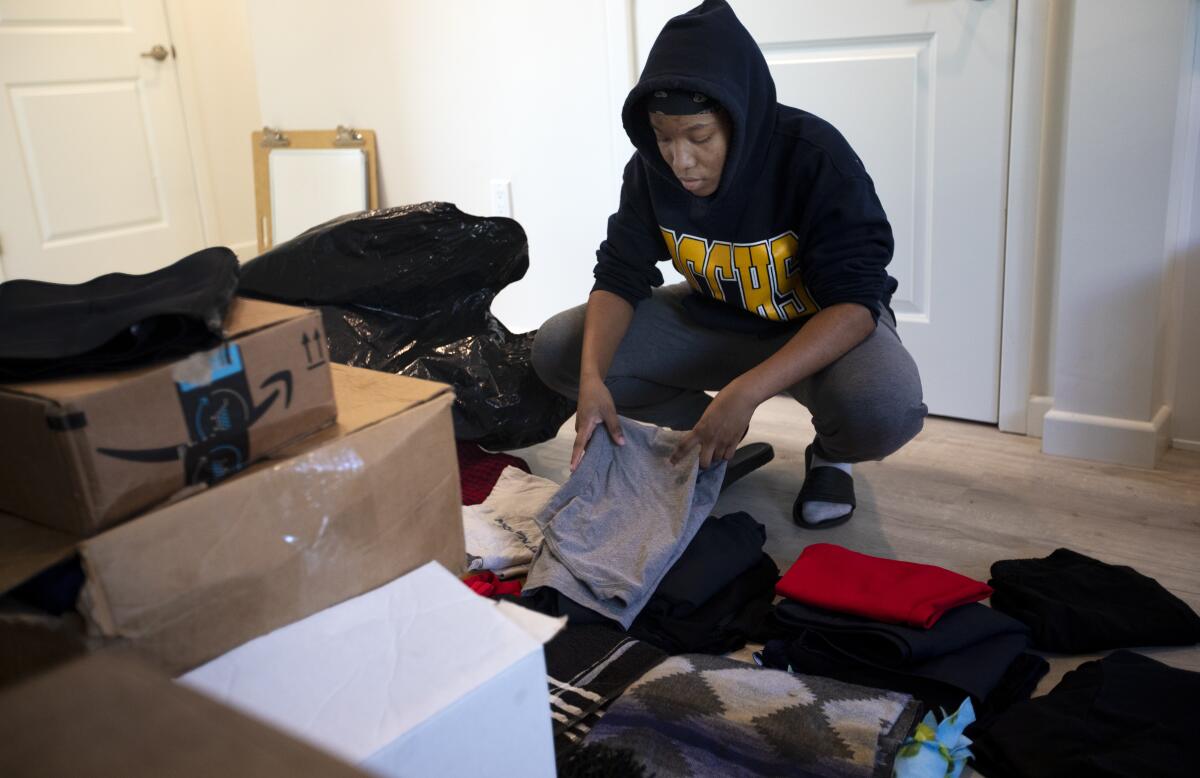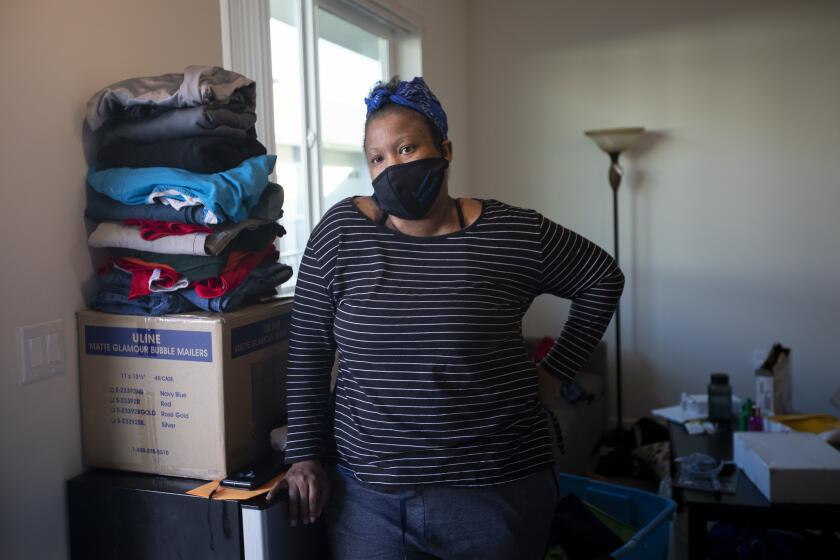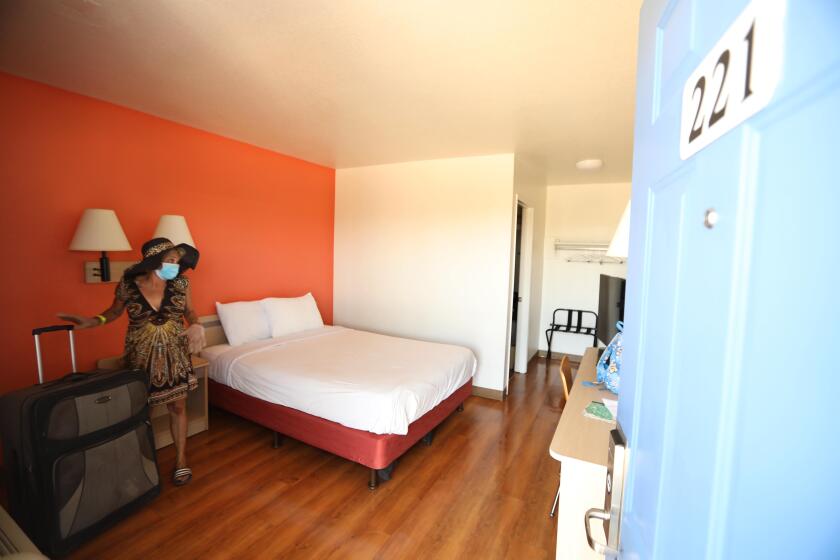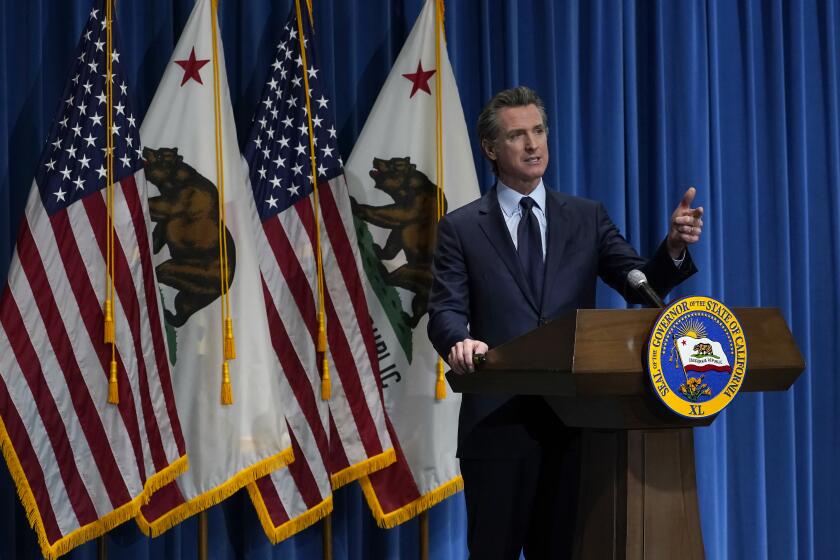Program to buy hotels for homeless people could get another influx of cash

- Share via
Last year, a small silver lining amid a deadly pandemic was a state program that helped municipalities buy hotels, motels and apartment buildings to house and shelter homeless people.
The program, Project Homekey, was a rare success in the effort to combat the state’s worsening homeless crisis.
Gov. Gavin Newsom’s proposed budget, unveiled Friday, includes $750 million to continue Project Homekey. Last year, the program was largely funded with federal coronavirus stimulus money, with the state government and philanthropic partners chipping in $100 million.
The budget proposal also allocates another $750 million to create more beds for people having mental health emergencies, so they don’t end up in emergency rooms or in jail.
“We have, as a nation, underinvested in those kinds of interventions for decades and decades,” said Jason Elliott, Newsom’s senior advisor on homelessness, who spearheaded Project Homekey last year.
Announced last summer, the Homekey program set off a mad dash by local officials and social services providers to find buildings that could be purchased quickly and then to move people into the rooms within 90 days. The federal dollars had to be spent by the end of 2020.
A state program, Project Homekey, has resulted in one of the largest expansions in shelter for homeless people ever. Without more federal funding, it will expire.
In the end, about 6,000 units, including 1,800 in Los Angeles, were purchased through the program.
Local officials stressed that given more time and resources, they could buy more buildings and repeat the process. Elliott said this was a big reason Newsom’s team decided to budget more money for the program — without the requirements imposed by the federal government.
Still, there will be an urgency to get started fast. Elliott hopes the Legislature will make $250 million of the $750 million available before Newsom’s budget, which will be debated by the Legislature before it is implemented, goes into effect in July.
“There were so many more projects that we could have funded had there been more time and more funding,” Elliott said of last year’s Homekey efforts. “A lot of local governments said, ‘We can’t close escrow by Dec. 30.’ That was reasonable. This new funding, even though it’s state funding, will still come with all of the same urgency.”
Local governments — mostly through their housing authorities — will compete for grants to buy and rehab buildings that can be converted into housing or shelters for homeless people. Of the money doled out last year, the city and county of Los Angeles together received about $270 million to make purchases.
We need to start treating homelessness like a public health crisis and compel local governments to respond, just as they have with COVID-19.
One such development was an apartment building in the San Fernando Valley, where 40 previously homeless families got a permanent roof over their heads beginning last month. Their rent is supplemented using Section 8 vouchers.
Homekey followed another statewide effort, known as Project Roomkey, to move vulnerable homeless people into rented hotel rooms. As that program wound down, the Homekey purchases ramped up.
Acquiring and adapting existing properties is far cheaper than building.
On average, the city of L.A. spent about $230,000 per unit, much less than the cost of building a unit of permanent supportive housing — the type that is deemed most effective in breaking the cycle of homelessness — from the ground up.
The California plan expects a $15.5-billion windfall in tax revenues, the result of pessimistic economic forecasts due to COVID-19, advisors said.
Officials said state legislation waiving the need for environmental and local land use approvals greatly expedited the closing of the purchases. Newsom’s budget proposal requests that the streamlining of the process continue.
Some units that L.A. city and county purchased were immediately turned into supportive housing, and others will function as interim housing until they can be renovated. Some required kitchenettes to be added before residents could move in.
These additional units could mean that fewer people are forced into congregate shelters where the coronavirus has run rampant.
Newsom’s budget proposal includes about $2 billion overall for homelessness and roughly $8 billion for housing. Some of this spending had already been announced in September.
More to Read
Sign up for Essential California
The most important California stories and recommendations in your inbox every morning.
You may occasionally receive promotional content from the Los Angeles Times.










